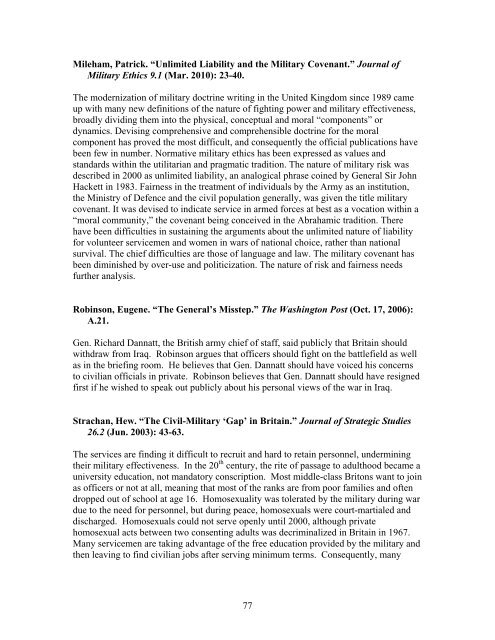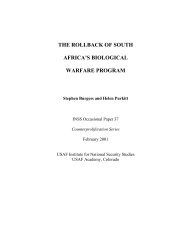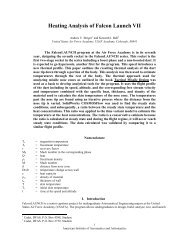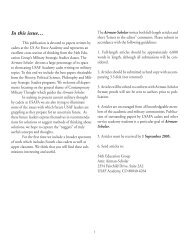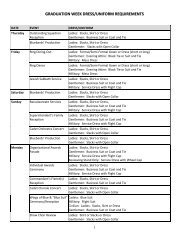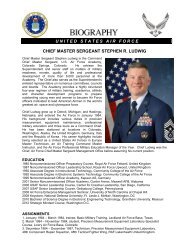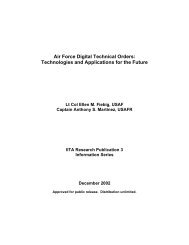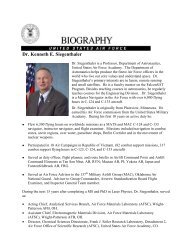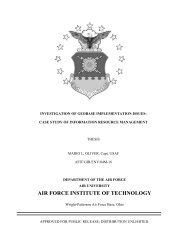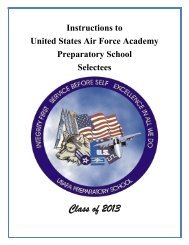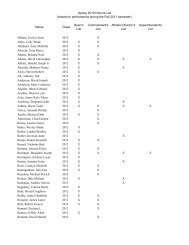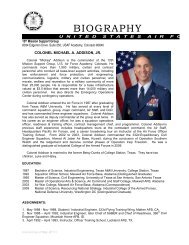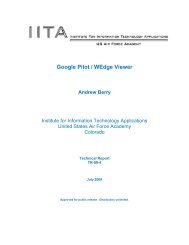Military Professionalism - United States Air Force Academy
Military Professionalism - United States Air Force Academy
Military Professionalism - United States Air Force Academy
You also want an ePaper? Increase the reach of your titles
YUMPU automatically turns print PDFs into web optimized ePapers that Google loves.
Mileham, Patrick. “Unlimited Liability and the <strong>Military</strong> Covenant.” Journal of<br />
<strong>Military</strong> Ethics 9.1 (Mar. 2010): 23-40.<br />
The modernization of military doctrine writing in the <strong>United</strong> Kingdom since 1989 came<br />
up with many new definitions of the nature of fighting power and military effectiveness,<br />
broadly dividing them into the physical, conceptual and moral “components” or<br />
dynamics. Devising comprehensive and comprehensible doctrine for the moral<br />
component has proved the most difficult, and consequently the official publications have<br />
been few in number. Normative military ethics has been expressed as values and<br />
standards within the utilitarian and pragmatic tradition. The nature of military risk was<br />
described in 2000 as unlimited liability, an analogical phrase coined by General Sir John<br />
Hackett in 1983. Fairness in the treatment of individuals by the Army as an institution,<br />
the Ministry of Defence and the civil population generally, was given the title military<br />
covenant. It was devised to indicate service in armed forces at best as a vocation within a<br />
“moral community,” the covenant being conceived in the Abrahamic tradition. There<br />
have been difficulties in sustaining the arguments about the unlimited nature of liability<br />
for volunteer servicemen and women in wars of national choice, rather than national<br />
survival. The chief difficulties are those of language and law. The military covenant has<br />
been diminished by over-use and politicization. The nature of risk and fairness needs<br />
further analysis.<br />
Robinson, Eugene. “The General’s Misstep.” The Washington Post (Oct. 17, 2006):<br />
A.21.<br />
Gen. Richard Dannatt, the British army chief of staff, said publicly that Britain should<br />
withdraw from Iraq. Robinson argues that officers should fight on the battlefield as well<br />
as in the briefing room. He believes that Gen. Dannatt should have voiced his concerns<br />
to civilian officials in private. Robinson believes that Gen. Dannatt should have resigned<br />
first if he wished to speak out publicly about his personal views of the war in Iraq.<br />
Strachan, Hew. “The Civil-<strong>Military</strong> ‘Gap’ in Britain.” Journal of Strategic Studies<br />
26.2 (Jun. 2003): 43-63.<br />
The services are finding it difficult to recruit and hard to retain personnel, undermining<br />
their military effectiveness. In the 20 th century, the rite of passage to adulthood became a<br />
university education, not mandatory conscription. Most middle-class Britons want to join<br />
as officers or not at all, meaning that most of the ranks are from poor families and often<br />
dropped out of school at age 16. Homosexuality was tolerated by the military during war<br />
due to the need for personnel, but during peace, homosexuals were court-martialed and<br />
discharged. Homosexuals could not serve openly until 2000, although private<br />
homosexual acts between two consenting adults was decriminalized in Britain in 1967.<br />
Many servicemen are taking advantage of the free education provided by the military and<br />
then leaving to find civilian jobs after serving minimum terms. Consequently, many<br />
77


